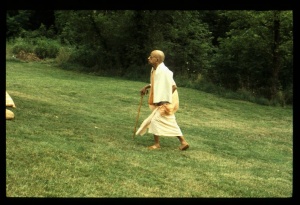RTW 1.1

A.C. Bhaktivedanta Swami Prabhupada
This Material Nature Is Full of Suffering
The editor of the daily Amrita Bazar Patrika, published from Allahabad, began the editorial the other day on a rather sad note:
The nation's week began with memories of 'Jalhianwallah-Bagh,' and political serfdom no longer troubles us. But our troubles are far from being at an end. In the dispensation of providence, mankind cannot have any rest. If one kind of trouble goes, another quickly follows. India, politically free, is faced with difficulties that are no less serious than the troubles under foreign rule.
Now, if one consults the accounts ledger of India's serfdom and freedom, and views the contents from a spiritual perspective, the conclusion will be as follows: The four yugas, or ages, namely Satya, Tretā, Dvāpara, and Kali, add up to 4,320,000 years. Kali-yuga, which lasts 432,000 years, began from the time of Mahārāja Parīkṣit's rule, some five thousand years ago. For approximately one thousand of these five thousand years—i.e., since the invasion of Mohammad Ghori in A.D. 1050—India has been experiencing foreign rule. In other words, when we calculate according to scripture, India has exercised absolute sovereignty over the entire planet Earth for a period of 3,772,000 years, till Mahārāja Parīkṣit's rule. Hence the meagre thousand years of foreign subjugation are not such a lamentable thing. Neither in the past nor at present has India's political serfdom or freedom been the prime concern of India's greatest thinkers and philosophers, who well knew the actual value of such things. The kings of India up to Mahārāja Parīkṣit were able to rule the entire world, and not for a mere couple of centuries but for hundreds of thousands of years. The reason for their rule was not a political one.
India's wise men of yore easily realized that the threefold miseries we humans are condemned to suffer can never be mitigated by the political condition controlling the country—whether foreign rule or freedom from it. At the dawn of modern history, the Armageddon fought in India over a political question lasted only eighteen days. On that historic battlefield the problem of human suffering and its permanent solution was discussed, and this discussion was compiled in the form of the Bhagavad-gītā.
Thus millennia ago the Bhagavad-gītā comprehensively discussed the same topic the editor of Amrita Bazar Patrika writes about in a despondent mood: "If one kind of trouble goes, another quickly follows." In the Gītā (7.14) Lord Kṛṣṇa says, "This divine energy of mine, consisting of the three modes of material nature, is difficult to overcome." The Sanskrit words daivī māyā used here can be translated into modern terms as "nature's law." This natural law is so stringent that it is impossible to overcome it, in spite of our prolific articles in the newspapers or our big conferences tabling motions that run into volumes. Our advanced technological and scientific efforts aimed at protecting us from the clutches of nature's law are futile because they are all controlled by the very same nature's law, or daivī māyā. Therefore trying to utilize mundane science to overpower nature's law is like creating a Frankenstein. Efforts to extirpate human suffering through advanced technology and bring about lasting happiness have brought us to the Atomic Age. Western thinkers have become gravely concerned about the extent of destruction an atomic explosion can cause. Some leaders are trying to calm the alarm with platitudes about how atomic energy is to be used solely for peaceful purposes, but this is another form of deception caused by daivī māyā, or nature's law.
It is impossible for anyone to surmount the two-pronged attack of daivī māyā—that is, her covering potency and her throwing potency. The more we try to conquer this divine energy, the more powerfully she defeats us by exciting us through the mode of passion and punishing us with the threefold miseries, culminating in all-devouring death. This struggle between the divine energy and the evil forces is eternal. Our inability to understand this struggle has led us to lament, "In the dispensation of providence, mankind cannot have any rest."
Despite repeatedly tasting defeat at the hands of the divine energy, the evil forces cannot understand why "mankind cannot have any rest." Yet in the Bhagavad-gītā the Supreme Personality of Godhead clearly explains this. At first He sternly warns the evil forces with these words, daivī hy eṣā guṇa-mayī mama māyā duratyayā: "This divine energy of Mine, consisting of the three modes of material nature, is difficult to overcome" (BG 7.14); and then in the next line He tells them how to overcome this divine energy, mām eva ye prapadyante māyām etāṁ taranti te: "But those who have surrendered unto Me can easily cross beyond it."